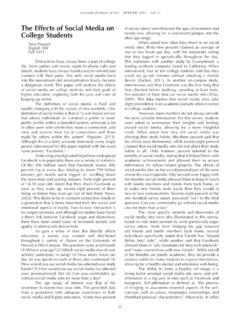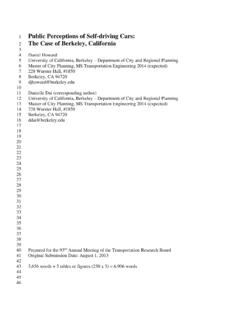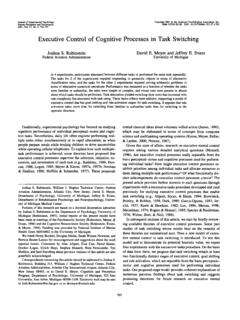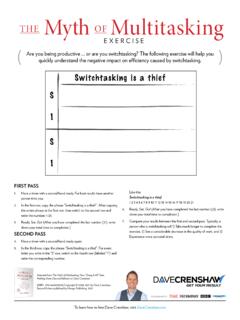Transcription of Multitasking: Why Your Brain Can’t Do It and What You ...
1 Multitasking: Why Your Brain Can t Do It and What You Should Do About K. MillerThe PicowerInstitute for Learning and Memory and Department of Brain and Cognitive Sciences,Massachusetts Institute of human solution to cheating time!Performing multiple tasks so we think! multitasking ?Effective multitasking is a MYTH!Our human solution to cheating time!Performing multiple tasks so we think! multitasking ?Reality: Your Brain has a very limited capacity for multiple simultaneous you multitask you are actually switching between the tasks, at great cost!Today s Main Take-Home Message:Don t use your cell phone when you of how good you think you are at it, you are driving accounts up to 50% of a result, you only see a small portion of the world in clarity at any given receptors in your eye are much denser at your center of vision (the fovea)The Myth of multitasking : You are sipping at the outside world through a You only see clearly at the very center of visionThe Myth of multitasking .
2 You are sipping at the outside world through a eyes are constantly darting around (~4/sec), taking in small pieces of high You only see clearly at the very center of visionYour Brain pieces together these brief snapshots into an illusionof a visual scenein which you clearly perceive everything Myth of multitasking : You are sipping at the outside world through a Brain gives you the illusion that you see more than you do because fills in blanks with predictions: If nothing was there a fraction of a second ago, there is nothing there now. The Myth of multitasking : You are sipping at the outside world through a Brain gives you the illusion that you see more than you do because fills in blanks with predictions: If nothing was there a fraction of a second ago, there is nothing there now.
3 The problem is that things can change quickly in a fraction of a Myth of multitasking : You are sipping at the outside world through a the problem is even worse:Your Brain has a limited capacity for simultaneous can only take in a few sips at a time!The Myth of multitasking : You are sipping at the outside world through a eyes are constantly darting around (~4/sec), taking in small pieces of high siphas a very limited bandwidthYour Brain can only perceive and process about 3-4 things simultaneouslyThe Myth of multitasking : You are sipping at the outside world through a average adult human can, at best, think only 3-4 things is called cognitive test of cognitive capacity:How many colored squares can you hold in mind?
4 Time1 sec. memory delayGet ready!Which square changed color?A Bit of Science: Why Can You Only Hold a Few Things in Mind? EEG recordings of Brain wavesBrain waves: coordinated oscillations of the activity of millions of from 1/sec to >100 Bit of Science: Why Can You Only Hold a Few Things in Mind? EEG recordings of Brain wavesBrain waves: coordinated oscillations of the activity of millions of from 1/sec to >100 wave may keep multiple thoughts from interfering with one another by juggling the thoughts (oscillating them out of phase of one another) Siegel, Warden, and Miller (2009)A Bit of Science: Why Can You Only Hold a Few Things in Mind? EEG recordings of Brain wavesBrain waves: coordinated oscillations of the activity of millions of from 1/sec to >100 wave may keep multiple thoughts from interfering with one another by juggling the thoughts (oscillating them out of phase of one another) Siegel, Warden, and Miller (2009)The cost is limited capacity for thought:Only a few thoughts can fit in each Brain wave ( , only a few balls can be juggled at a time).
5 The Myth of multitasking : You are sipping at the outside world through a clarity of vision + limited cognitive capacity = A bit of perception and a lot of mental filling of the on the phoneNot talking on the phoneThe Myth of multitasking : You are sipping at the outside world through a clarity of vision + limited cognitive capacity = A bit of perception and a lot of mental filling of the problem: Attention to one thing means much less attention (perception) of other things. Talking on the phoneNot talking on the phoneThe Myth of multitasking : You are sipping at the outside world through a clarity of vision + limited cognitive capacity = A bit of perception and a lot of mental filling of the t believe me? Let s take a test!
6 Talking on the phoneNot talking on the phoneFRIGHTENING STUDIESU sing a driving simulator, David Strayerand co showed that we re WAAAAY more impaired than we think when driving while on a cell phone call! Cell phone use while driving induces a form of inattentional blindness Eyetrackingshows phoning drivers fail to notice HALF the items falling on retina!!! More than twice as likely to miss a traffic signal React substantially slower to info they did detectWhat About Hands-free Phones?Q: Are people better at multitasking ( , phoning and driving) with hands-free cell phone?What About Hands-free Phones?Q: Are people better at multitasking ( , phoning and driving) with hands-free cell phone?If you keep your eyes on the road, you won t miss anything, right?
7 What About Hands-free Phones?Q: Are people better at multitasking ( , phoning and driving) with hands-free cell phone?If you keep your eyes on the road, you won t miss anything, right?Let s take a test!A: There s ZERO difference in distractibility between handheld and hands-free!!!=What About Hands-free Phones?Q: Are people better at multitasking ( , phoning and driving) with hands-free cell phone?Does Practice Make Perfect?Q: Can you get better at multitasking if you keep at it?Why Is Talking on Cell Phones So Bad, If Talking to a Passenger is OK? Trying to do two things at once requires executive Brain control to coordinate them. Because of our limited capacity, we have to make moment-to-moment decisions about Is Talking on Cell Phones So Bad, If Talking to a Passenger is OK?
8 Trying to do two things at once requires executive Brain control to coordinate them. Because of our limited capacity, we have to make moment-to-moment decisions about passenger helps (or least doesn t hurt) this adjusts conversation timing depending on driving demandsPassenger also acts as 2nd source of attentionWhy Is Talking on Cell Phones So Bad, If Talking to a Passenger is OK? Does Practice Make Perfect?Q: Can you get better at multitasking if you keep at it?Chronic vs. light cell phone Practice Make Perfect?Q: Can you get better at multitasking if you keep at it?Chronic vs. light cell phone simulation tests found no difference in distractibility!=People who report being well-practiced at using cell phones when driving miss as many things as people who rarely do Some People Better At multitasking ?
9 Ophiret al (2009) asked 100s of Stanford students, Do you multitask a lot or a little? Are Some People Better At multitasking ?Time1 sec. memory delayGet ready!Which square changed color?Some people thinkthey are, but they are actually worse!Students who multitask a lot actually have a lower, not higher, cognitive capacity. multitasking and Self-DelusionMelina Uncapher s(Stanford) studies have shown that heavy multitaskersare more distractible to irrelevant and Self-DelusionMelina Uncapher s(Stanford) studies have shown that heavy multitaskersare more distractible to irrelevant sensation-seeking and impulsiveHIGHLY confident in ability to efficiently multitask (even they are bad at it)! multitasking and Self-DelusionMelina Uncapher s(Stanford) studies have shown that heavy multitaskersare more distractible to irrelevant sensation-seeking and impulsiveHIGHLY confident in ability to efficiently multitask (even they are bad at it)!
10 Perceived ability and actual ability inversely relatedOverconfidence (rather than skill) may drive proliferation of and Self-DelusionMelina Uncapher s(Stanford) studies have shown that heavy multitaskersare more distractible to irrelevant sensation-seeking and impulsiveHIGHLY confident in ability to efficiently multitask (even they are bad at it)!Perceived ability and actual ability inversely relatedOverconfidence (rather than skill) may drive proliferation of don t multitask more because they are better at it. They multitask more because they are more distractible (can t help themselves) and have an inflated confidence in their abilities to multitask. Another Cost of multitasking : Reduced Cognitive AbilityBecause of our limited cognitive capacity, we don t really multitask.







